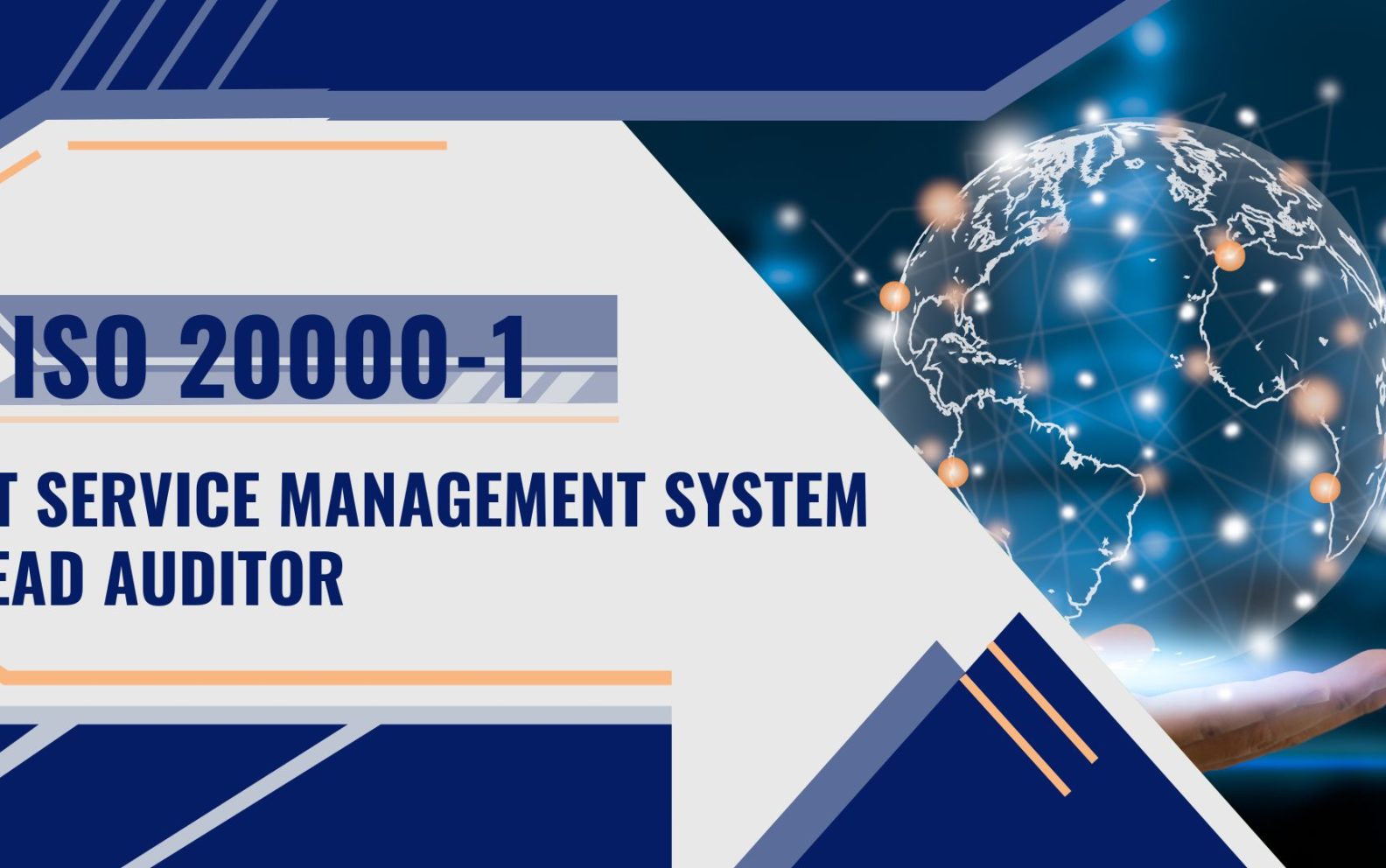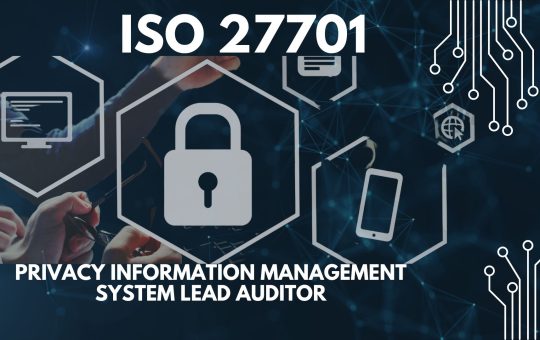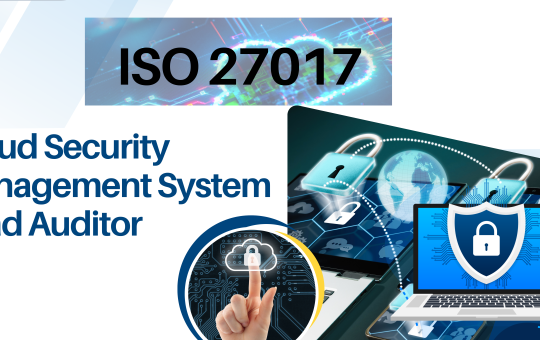
ISO 20000-1: IT Service Management System Lead Auditor
- Obtain globally recognized certification as an ISO 20000-1 Lead Auditor.
- Develop advanced auditing skills tailored to IT service management processes.
- Enhance organizational performance by ensuring compliance with international ITSM standards.
- Boost career opportunities in IT service management and auditing roles.
- Strengthen your ability to identify gaps and implement corrective actions in ITSM frameworks.
- Understand the principles and requirements of ISO 20000-1 standards.
- Master the audit lifecycle, including planning, execution, and reporting.
- Assess IT service management processes for compliance and effectiveness.
- Identify non-conformities and recommend strategies for continuous improvement.
- Gain proficiency in using auditing tools and techniques specific to IT service management.
- Foster alignment of IT services with organizational goals and customer needs.
- Expert Trainers: Led by experienced professionals with hands-on knowledge in ITSM auditing.
- Interactive Training: Practical exercises and case studies to solidify understanding.
- Global Recognition: Certification that boosts career prospects across industries.
- Comprehensive Materials: Access to detailed resources for post-training support.
- Flexible Learning: Tailored programs to fit your schedule and professional needs.
Study Units
- Introduction to IT Service Management and ISO 20000-1 Standards
- Overview of ITSM and its role in modern organizations.
- Key principles and objectives of ISO 20000-1.
- ISO 20000-1 Framework and Clauses
- Understanding the structure of ITSMS and its requirements.
- Leadership, planning, and operational processes.
- Audit Planning and Execution
- Preparing and conducting ITSMS audits.
- Techniques for evidence collection and stakeholder interviews.
- Service Management Practices
- Key processes like incident, problem, and change management.
- Evaluating service delivery and performance metrics.
- Non-Conformity Reporting and Corrective Actions
- Identifying deviations and crafting actionable recommendations.
- Follow-up audits to ensure compliance and improvement.
- Continuous Improvement of ITSMS
- Encouraging proactive monitoring and refinement of IT services.
- Strategies for aligning ITSM with evolving business needs.
Upon successful completion of the ISO 20000-1 Lead Auditor course, participants will be able to demonstrate the following professional competencies:
Audit Leadership:
Plan, lead, and manage ISO 20000-1 audits effectively, ensuring compliance with ISO 19011 and ISO/IEC 17021 standards.Service Management Evaluation:
Assess the effectiveness and maturity of IT service management systems, ensuring alignment with business and customer needs.Risk-Based Assessment:
Identify and evaluate IT service risks, performance issues, and areas requiring improvement within ITSMS processes.Compliance and Control Verification:
Verify conformity with ISO 20000-1 requirements, organizational policies, and service-level agreements (SLAs).Audit Reporting and Communication:
Prepare comprehensive audit reports that clearly communicate findings, risks, and actionable recommendations.Corrective and Preventive Action:
Identify non-conformities, conduct root cause analysis, and recommend improvement actions to enhance service performance.Integration with Other Standards:
Understand the relationships between ISO 20000-1, ISO 27001 (Information Security), and ITIL frameworks.Continuous Improvement:
Facilitate ongoing improvement of ITSM systems and encourage a culture of quality, reliability, and service excellence.Stakeholder Engagement:
Effectively collaborate with IT, compliance, and business teams to ensure holistic and sustainable IT service management practices.
This course is designed for professionals involved in auditing, managing, or improving IT service management systems in alignment with ISO 20000-1 standards. It is ideal for:
IT Service Managers and Coordinators: Looking to enhance their ability to manage, evaluate, and audit IT service management systems.
Internal and External Auditors: Aiming to qualify as ISO 20000-1 Lead Auditors to conduct first-, second-, or third-party ITSM audits.
Quality and Compliance Managers: Ensuring organizational IT service delivery meets international standards and customer expectations.
IT Governance and Risk Professionals: Focused on aligning IT services with business objectives and risk management frameworks.
Consultants and Advisors: Assisting organizations in implementing and maintaining ISO 20000-1-compliant service management systems.
IT Professionals Seeking Advancement: Aspiring to move into IT auditing, compliance, or IT service governance leadership roles.
Our assessment process is designed to ensure every learner achieves the required level of knowledge, skills, and understanding outlined in each course unit.
Purpose of Assessment
Assessment helps measure how well a learner has met the learning outcomes. It ensures consistency, quality, and fairness across all learners.
What Learners Need to Do
Learners must provide clear evidence that shows they have met all the learning outcomes and assessment criteria for each unit. This evidence can take different forms depending on the course and type of learning.
Types of Acceptable Evidence
Assignments, reports, or projects
Worksheets or written tasks
Portfolios of practical work
Answers to oral or written questions
Test or exam papers
Understanding the Structure
Learning outcomes explain what learners should know, understand, or be able to do.
Assessment criteria set the standard learners must meet to achieve each learning outcome.
Assessment Guidelines
All assessment must be authentic, current, and relevant to the unit.
Evidence must match each assessment criterion clearly.
Plagiarism or copied work is not accepted.
All learners must complete assessments within the given timelines.
Where applicable, assessments may be reviewed or verified by internal or external quality assurers.
Full learning outcomes and assessment criteria for each qualification are available from page 8 of the course handbook.
Top Courses
No results found.
Related Courses
Let's Get in touch
Deleting Course Review
Course Access
This course is password protected. To access it please enter your password below:



